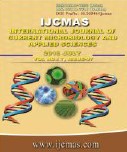


 National Academy of Agricultural Sciences (NAAS)
National Academy of Agricultural Sciences (NAAS)

|
PRINT ISSN : 2319-7692
Online ISSN : 2319-7706 Issues : 12 per year Publisher : Excellent Publishers Email : editorijcmas@gmail.com / submit@ijcmas.com Editor-in-chief: Dr.M.Prakash Index Copernicus ICV 2018: 95.39 NAAS RATING 2020: 5.38 |
A total of 66 fungal endophytes were isolated from apparently healthy tomato plant parts viz., root, stem and leaf tissues and evaluated against soil- borne pathogens viz., Sclerotium rolfsii, Rhizoctonia solani and Fusarium solani by dual culture method to test antifungal activity of tomato fungal endophytes. In dual culture method, among the 66 fungal isolates, irrespective of isolates from root, stem and leaf, some (RFHHO-7, RFHKM-9, RFDHE-10, RFBBA-23, SFDOF-11, SFDDE-12, LFDHO-3 and LFDLA-9) have shown maximum mycelial inhibition of three pathogens. Isolates RFBBE-19 and RFDUN-22 were fast growing isolates and were more effective against F. solani and R. solani as compared to S. rolfsii. Isolate LFDKA-20 though showed the minimum inhibition against all pathogens as compared to other effective isolates but it also showed the clear inhibition zone which may be due to the production of antimicrobial compounds from the endophyte. From the results of present study it is concluded that the possible role of growth inhibition by the endophytes was attributed to the production of diffusible and volatile metabolites, lytic enzymes and by competition with pathogens.
 |
 |
 |
 |
 |